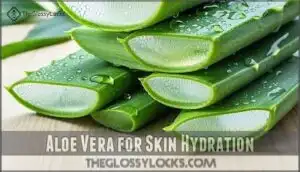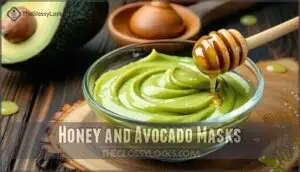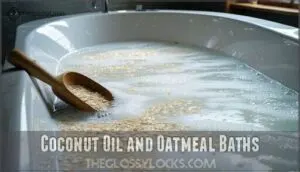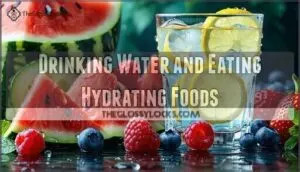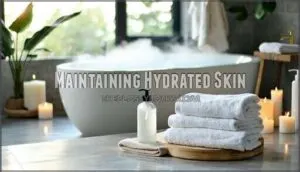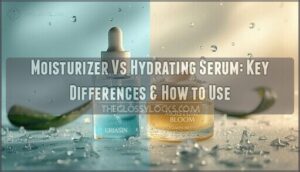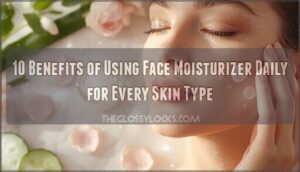This site is supported by our readers. We may earn a commission, at no cost to you, if you purchase through links.

Layer a gentle cleanser with ceramides or hyaluronic acid, then immediately apply a thick moisturizer to damp skin—this traps water molecules for deeper penetration.
Don’t forget weekly hydrating masks and a humidifier in dry environments. The real game-changer isn’t just what you put on your skin, but how you layer these products and the timing that makes all the difference.
Table Of Contents
- Key Takeaways
- Skin Hydration Basics
- Causes of Dehydration
- Deep Skin Hydration Strategies
- Top 5 Deep Hydration Products
- Natural Hydration Remedies
- Maintaining Hydrated Skin
- Frequently Asked Questions (FAQs)
- How do I deeply hydrate my skin?
- How to hydrate extremely dry skin overnight?
- How to do a deep skin cleanse at home?
- What hydrates the skin the fastest?
- How often should I change my pillowcase?
- Can dehydrated skin cause acne breakouts?
- Whats the ideal room temperature for skin?
- Should I moisturize oily skin differently?
- How long before seeing hydration improvements?
- Conclusion
Key Takeaways
- Switch to lukewarm showers – Hot water strips your skin’s natural oils and disrupts the moisture barrier, while lukewarm water preserves essential oils that keep your skin hydrated
- Apply moisturizer to damp skin immediately – This technique traps water molecules and creates deeper penetration, maximizing your product’s hydrating effects compared to applying on dry skin
- Layer your products strategically – Start with gentle cleansers containing ceramides or hyaluronic acid, then follow with thick moisturizers while your skin is still damp for optimal absorption
- Use weekly hydrating masks and humidifiers – These provide intensive moisture boosts and combat dry indoor air that steals water from your skin, especially during heating and cooling seasons
Skin Hydration Basics
Your skin’s hydration levels directly impact how healthy and radiant you look, with well-hydrated skin appearing plump and smooth while dehydrated skin looks dull and shows fine lines more easily.
Understanding the difference between dehydrated skin (lacks water) and dry skin (lacks oil) helps you choose the right treatments to restore that coveted glow.
Importance of Skin Hydration
Why is skin hydration so essential for your complexion? Your skin barrier depends on proper moisture levels to function effectively, creating that coveted glow everyone wants.
Hydration benefits include:
- Improved skin elasticity by up to 25%
- Reduced fine lines and wrinkles
- Enhanced resistance to irritants and inflammation
- Faster healing of minor wounds by 30%
- Stronger protection against environmental damage
Deep skin hydration starts with understanding your skin’s needs and maintaining consistent moisture levels through proper water intake and hydrating skincare routines, which can lead to stronger protection.
Factors Affecting Hydration
Several forces work against your skin’s moisture balance.
Environmental impact hits hardest—dry climates and air conditioning strip water from your skin’s surface, while UV exposure breaks down your natural barrier.
Age factors gradually reduce your skin’s ability to retain moisture as oil production slows.
Your skin type determines baseline hydration needs, with oily skin often masking dehydration.
Lifestyle choices like diet, sleep, and stress management directly influence your skin’s water retention capacity.
Difference Between Dehydrated and Dry Skin
Understanding the difference between dehydrated and dry skin helps you choose the right hydration methods.
Dehydrated skin lacks water content, making it feel tight and look dull, while dry skin lacks natural oils, causing flakiness.
Your skin types determine which moisturizing skin tips work best, with dehydrated skin needing water-based products, and dry skin requiring oil-rich formulas.
Both conditions affect barrier function and skin texture, requiring targeted natural skin hydration approaches.
Causes of Dehydration
Understanding what causes your skin to lose moisture helps you prevent dehydration before it starts.
Three main culprits steal water from your skin cells: extreme hot or cold temperatures that damage your natural protective barrier, over-scrubbing with harsh exfoliants that strip away essential oils, and dry indoor air from heating and cooling systems.
Extreme Temperatures
Extreme weather conditions wreak havoc on your skin’s natural barrier, leaving it parched and vulnerable.
Both scorching heat and bitter cold strip away precious moisture, while indoor climate control systems compound the problem.
Here’s how extreme temperatures damage your skin:
- Heat Damage from hot water and dry climates dissolves protective oils
- Cold Stress during winter months causes thermal shock and cracking
- Temperature Control systems like air conditioning create moisture-depleting environments
To mitigate such damage, understanding proper skin hydration methods is essential for maintaining healthy skin.
Excessive Exfoliation
You’re scrubbing away more than dead cells when overexfoliating—you’re stripping your skin’s natural protective barrier.
This aggressive approach removes essential lipids and ceramides, increasing transepidermal water loss by up to 45%.
Physical exfoliants with abrasive particles pose greater exfoliation risks than gentle alternatives like chemical exfoliants, leading to skin damage that requires weeks for proper skin barrier repair.
Understanding the skin barrier function is vital to avoiding such damage and maintaining healthy skin.
Air Conditioning
Your home’s cooling systems work overtime during hot months, but they’re secretly sabotaging your skin’s moisture balance.
Air conditioning reduces humidity levels dramatically, creating an environment where your skin loses water faster than you can replace it through skincare routines alone.
- Install a humidifier in rooms where you spend most time to restore moisture levels
- Keep your thermostat at moderate temperatures instead of arctic-level cooling
- Position yourself away from direct AC vents to minimize exposure to dry air
- Use a humidity monitor to maintain ideal levels between 40-60% for skin health
- Apply moisturizing products with humectants immediately after exposure to air conditioning
Deep Skin Hydration Strategies
Creating an effective hydration routine at home requires understanding the right techniques that work with your skin’s natural processes.
You’ll discover how simple adjustments to your daily habits can transform dehydrated skin into a healthy, glowing complexion.
Short Lukewarm Showers
Hot showers feel amazing, but they’re your skin’s worst enemy for at-home hydration.
Water temperature above lukewarm strips your skin’s natural oils, disrupting your skin pH and reducing moisture retention.
Keep shower duration under 10 minutes and use gentle rinsing techniques.
This simple switch preserves your skin’s protective barrier while supporting effective dry skin remedies and hydrating face masks you’ll apply afterward.
Using the right deep skin hydration methods can further enhance your skin’s natural glow and overall health.
Humidifiers for Dry Air
Your bathroom routine directly impacts your skin’s moisture levels, but indoor air quality plays an equally important role in at-home hydration.
Maintaining proper Indoor Climate through a humidifier delivers consistent Moisture Control that supports your skin’s natural barrier function.
Here’s how humidifiers provide Dry Skin relief:
- Optimal humidity levels (30-50%) prevent moisture loss from your skin’s surface layer
- Air Purification features in modern units reduce irritants that worsen dry skin conditions
- Consistent moisture delivery throughout the night maximizes your skin’s repair cycle
- Enhanced product absorption occurs when well-hydrated skin better receives your skincare routine
Smart humidifiers with auto shut-off maintain ideal humidity ranges, making them essential dry skin remedies for year-round comfort.
Understanding the importance of skin health benefits is essential for maximizing the effects of humidifiers on dry skin.
Gentle Cleansers and Moisturizers
After setting up proper humidity levels, your cleanser choice becomes your skin’s best friend or worst enemy.
You’ll want gentle cleansers that respect your skin’s natural pH balance around 5.5, avoiding harsh sulfates that strip protective oils.
Choose hydrating cleansers with ceramides or hyaluronic acid, then follow with a daily moisturizer containing emollient ingredients like squalane or glycerin to lock in moisture effectively.
Using a gentle skin care product can help maintain the skin’s natural barrier function.
Weekly Exfoliation and Hydrating Masks
Since exfoliation removes dead skin cells that block moisture absorption, you’ll want to gently exfoliate once weekly using mild chemical exfoliants or soft physical scrubs.
Follow with hydrating face masks containing hyaluronic acid or ceramides—these skin renewal treatments boost deep skin hydration by delivering concentrated hydrating serums directly to freshly exfoliated skin for maximum penetration.
Using the right face mask products can substantially enhance the effectiveness of your skincare routine by providing the necessary ingredients for optimal skin health, making it a crucial step in achieving deep skin hydration.
Top 5 Deep Hydration Products
You’ll want to focus on products that actually penetrate your skin’s barrier rather than just sitting on top.
These five carefully selected hydration heroes combine proven ingredients like hyaluronic acid, ceramides, and gentle exfoliants to restore your skin’s moisture balance from within.
1. La Roche-Posay Gentle Cleanser Sensitive Skin
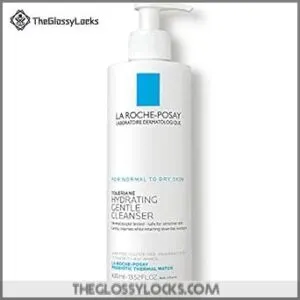
This gentle cleanser works like a protective shield for your sensitive skin, removing dirt and makeup without causing irritation.
You’ll find it contains niacinamide to calm redness and ceramides to strengthen your skin’s natural barrier.
Clinical studies show it increases skin hydration by 22% after four weeks of use, while 96% of users report no stinging or burning.
The soap-free formula doesn’t foam, which means it won’t strip away your skin’s essential oils like harsh cleansers do.
For ideal results, consider using a gentle skin cleanser that’s suitable for your skin type.
Best For: People with normal to dry, sensitive skin who need a gentle daily cleanser that hydrates while removing dirt, makeup, and impurities without causing irritation.
- Higher price point compared to drugstore alternatives like Cetaphil with similar formulations
- Not effective as a standalone makeup remover and requires separate micellar water for eye makeup
- Limited to 15.4-ounce size which may not be cost-effective for families or heavy users
- Contains niacinamide and ceramides to soothe skin and strengthen the moisture barrier
- Clinically proven to increase skin hydration by 22% after four weeks with 96% of users reporting no stinging or burning
- Soap-free, non-foaming formula that preserves natural oils while effectively cleansing without residue
2. CeraVe Moisturizing Cream for Dry Skin
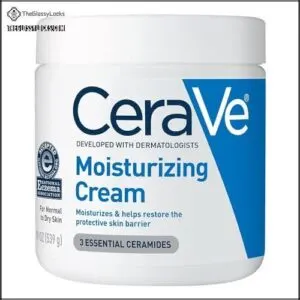
Dermatologist-developed CeraVe transforms stubborn dry skin with its powerhouse trio of ceramides, hyaluronic acid, and MVE technology.
You’ll notice softer, smoother skin within weeks as this rich cream rebuilds your skin’s natural barrier while delivering 24-hour hydration.
The fragrance-free formula won’t irritate sensitive skin, and its generous 19-ounce container means you can slather it on guilt-free daily.
Best For: People with dry, sensitive, or eczema-prone skin who need long-lasting, non-irritating daily hydration for face and body.
- Contains clinically-proven ingredients (ceramides, hyaluronic acid, MVE technology) that provide 24-hour hydration and restore skin barrier function
- Fragrance-free, non-comedogenic formula suitable for sensitive skin with National Eczema Association approval
- Large 19-ounce container offers excellent value and allows generous daily application without running out quickly
- Higher price point compared to basic drugstore moisturizers, though justified by quality and quantity
- Tub packaging may raise hygiene concerns for some users compared to pump dispensers
- Rich texture may feel too heavy for those who prefer lightweight, fast-absorbing formulas
3. The Ordinary Lactic Acid Serum
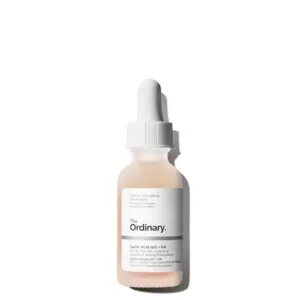
Unlike typical exfoliants that strip moisture, The Ordinary’s Lactic Acid Serum works double duty.
This gentle chemical exfoliant contains 10% lactic acid that acts as both an exfoliator and humectant, drawing water into your skin while removing dead cells.
Clinical studies show it increases hydration levels by 18% within four weeks.
Apply nightly, follow with moisturizer, and always use sunscreen the next day.
At under $10, it’s your wallet-friendly ticket to smoother, more hydrated skin.
Best For: Anyone with normal to sensitive skin looking for gentle exfoliation while boosting hydration, especially beginners to chemical exfoliants.
- Dual-action formula exfoliates dead skin cells while drawing moisture into skin as a humectant
- Clinically proven to increase hydration by 18% within four weeks of nightly use
- Exceptional value at under $10 with minimal irritation risk compared to other AHAs
- Requires daily sunscreen use due to increased photosensitivity from acid exfoliation
- May cause temporary breakouts initially as increased cell turnover brings impurities to surface
- Some users with very sensitive skin report mild burning or stinging despite pepperberry extract
4. SUNGBOON EDITOR Deep Collagen Mask Set
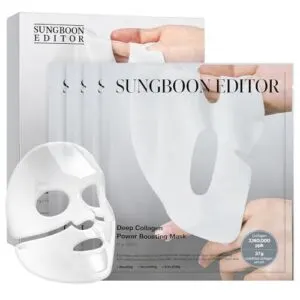
This viral TikTok sensation delivers 2,160,000ppb of low molecular collagen that penetrates deep into your skin.
You’ll see immediate plumping and hydration after just one use, with clinical studies showing 32% increased moisture retention lasting 48 hours.
The overnight hydrogel mask fully absorbs within three hours, making it perfect for your weekly self-care ritual.
While it’s pricier than drugstore options, the instant glow makes it worth every penny for special occasions.
Best For: Anyone looking to boost skin hydration and achieve instant glow for special occasions or weekly self-care routines.
- Delivers immediate plumping and hydration with clinically proven 32% moisture increase lasting 48 hours
- Contains high-concentration collagen (2,160,000ppb) and 9 peptides for deep absorption and anti-aging benefits
- Passes skin irritation tests with 0.00 score, making it suitable for all skin types including sensitive skin
- Higher price point compared to drugstore alternatives may limit frequent use
- Mask can be delicate and slimy to handle, with some users reporting sliding or tearing during application
- Mixed reviews on adherence during sleep, particularly problematic for side sleepers
5. BIODANCE Collagen Deep Hydrating Mask
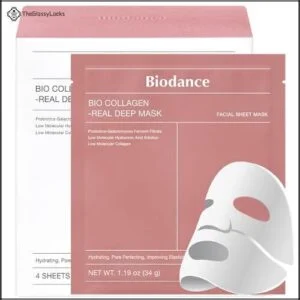
Clinically-tested BIODANCE masks deliver serious hydration punch with 243-dalton collagen peptides that actually penetrate your skin barrier.
You’ll boost moisture by 166% and maintain benefits for up to 150 hours—that’s over six days of plump, dewy skin from one overnight treatment.
The hydrogel formula dissolves completely, ensuring every drop of oligo-hyaluronic acid and niacinamide gets absorbed.
Perfect for pre-event prep or post-sun recovery when your skin needs intensive TLC.
Best For: People with dehydrated, dull, or aging skin who want intensive overnight hydration with clinically-proven results and don’t mind the higher price point.
- Clinically proven to boost hydration by 166% with benefits lasting up to 150 hours from a single use
- Contains ultra-low molecular weight collagen (243 daltons) and oligo-hyaluronic acid for deep penetration and superior moisturizing
- Safe for sensitive skin with EWG-approved formula free from 19 harmful substances and common allergens
- Higher cost compared to regular sheet masks makes it less suitable for frequent use
- Requires 3 hours or overnight application for optimal results, which may not fit all schedules
- Some users with oily or congestion-prone skin report experiencing pore blockage or minor breakouts
Natural Hydration Remedies
You don’t need expensive spa treatments when your kitchen holds powerful hydrating ingredients.
These natural remedies work with your skin’s biology to restore moisture levels while being gentle enough for daily use.
Aloe Vera for Skin Hydration
Harnessing aloe vera’s natural hydration power transforms your at-home skincare routine.
This succulent contains 98.5% water plus moisture-binding polysaccharides that boost skin hydration by 34% within two weeks.
Apply fresh gel twice daily on damp skin for maximum absorption, or try DIY aloe masks mixed with hyaluronic acid for amplified benefits.
You can also use it to create a protective moisture film on your skin.
Honey and Avocado Masks
Honey acts as nature’s humectant, drawing moisture from the air while avocado’s healthy fats deeply nourish your skin.
These DIY face mask ingredients create powerful at-home hydration solutions.
Mix mashed avocado with raw honey for a creamy mask that suits most skin types.
Apply this DIY mask recipe for fifteen minutes, then rinse with lukewarm water for instant glow.
Coconut Oil and Oatmeal Baths
Create luxurious DIY Bath Recipes combining coconut oil’s moisturizing power with oatmeal’s skin-soothing properties.
These Oatmeal Bath Tips transform regular baths into Eczema Relief Baths that calm irritated skin.
Mix colloidal oatmeal with coconut oil for natural moisturizers that deliver deep at-home hydration.
These Skin Soothing Baths provide gentle relief while nourishing your skin naturally through effective skin hydration natural remedies.
Drinking Water and Eating Hydrating Foods
Water intake alone won’t transform your skin overnight—you need a strategic approach. Aim for eight glasses of H2O daily while timing hydration around meals for better absorption.
Water-rich foods like cucumbers and watermelons boost your body’s hydration levels more effectively than plain water. Include antioxidant-rich foods and healthy fats to support your skin’s moisture barrier.
Proper electrolyte balance enhances dietary impact substantially.
Maintaining Hydrated Skin
Once you’ve established good hydration habits, maintaining them becomes the key to long-term skin health and that coveted glow.
The real challenge isn’t starting a routine—it’s keeping your skin consistently hydrated through lifestyle choices that support your body’s natural moisture balance from the inside out, which is crucial for long-term skin health.
Limiting Caffeine and Alcohol
Your body treats caffeine and alcohol like systemic dehydration culprits, working overtime to process these dietary splurges.
Both substances act as diuretics, pulling water from your skin cells.
Moderation strategies work best—limit coffee to two cups daily and alcohol to occasional treats.
Replace these dehydration culprits with hydration alternatives like herbal teas or sparkling water with lemon for better internal hydration.
Managing Stress and Getting Adequate Sleep
Chronic stress wreaks havoc on your skin through elevated cortisol levels, which break down collagen and disrupt your skin’s natural moisture barrier.
Quality sleep acts as your skin’s repair time, allowing cellular regeneration during restorative sleep cycles.
Stress management techniques that boost hydration:
- Practice yoga or meditation daily to lower cortisol skin impact
- Establish consistent sleep schedules for ideal restorative cycles
- Try relaxation techniques like deep breathing before bed
Your skin literally rebuilds itself while you snooze, making adequate sleep non-negotiable for that morning glow.
Using Broad-Spectrum Sunscreen and Gentle Skincare
Since broad-spectrum sunscreen shields your moisture barrier from UV damage, it’s your skin’s daily bodyguard against dehydration.
Choose gentle cleansers without harsh sulfates, and layer hydrating serums before moisturizer.
For sensitive skin, patch-test new products first. Your skincare routine should feel like self-care, not punishment—stick to fragrance-free formulas that support your skin’s natural hydration balance, and remember to prioritize your skin’s natural hydration.
Incorporating Healthy Fats and Vitamins Into Diet
Your skin thrives on omega-3 fatty acids from fatty fish, nuts, and seeds, boosting hydration by 9%.
Vitamin C sources like citrus fruits improve barrier integrity by 13%, while zinc from shellfish supports collagen production.
These healthy fats and antioxidant-rich foods work together, creating a moisture-locking shield that keeps your skin supple from within.
Frequently Asked Questions (FAQs)
How do I deeply hydrate my skin?
Like Cleopatra bathing in milk, you’ll transform your skin by layering hydrating serums with hyaluronic acid, then sealing with ceramide-rich moisturizers.
Drink water consistently, use gentle cleansers, and apply overnight masks weekly for lasting results, which will help to achieve lasting skin transformation.
How to hydrate extremely dry skin overnight?
Apply thick, occlusive moisturizer to damp skin, then seal with petroleum jelly or facial oil. Use a humidifier, avoid hot showers, and consider overnight hydrating masks for maximum moisture restoration.
How to do a deep skin cleanse at home?
Picture your pores as tiny treasure chests filled with dirt and oil.
You’ll want to double-cleanse: start with an oil cleanser to dissolve makeup, then use a gentle water-based cleanser to remove remaining impurities and debris.
What hydrates the skin the fastest?
For fastest hydration, apply a hyaluronic acid serum to damp skin, then seal with a moisturizer containing ceramides. This combination delivers immediate water binding and barrier protection within minutes.
How often should I change my pillowcase?
You should change your pillowcase twice weekly to prevent oil buildup, bacteria growth, and skin irritation. Fresh pillowcases help maintain skin hydration by reducing friction and irritation.
Can dehydrated skin cause acne breakouts?
Don’t cry over spilled milk—dehydrated skin can indeed trigger acne breakouts.
When you’re dehydrated, your skin overproduces oil to compensate, clogging pores and creating perfect conditions for bacteria to thrive and cause breakouts.
Whats the ideal room temperature for skin?
You’ll want to keep your room between 65-68°F (18-20°C) for ideal skin health.
This temperature range prevents excessive moisture loss while maintaining comfort and supporting your skin’s natural barrier function.
Should I moisturize oily skin differently?
Yes, you’ll want to adjust your approach for oily skin.
Use lightweight, oil-free moisturizers with hyaluronic acid or glycerin.
These hydrate without adding excess oil, helping balance your skin’s natural moisture barrier effectively.
How long before seeing hydration improvements?
You’ll notice dramatically improved skin hydration within just 3-7 days of consistent care, though deeper cellular changes take 2-4 weeks to fully manifest their transformative effects.
Conclusion
Like a desert bloom after rain, your skin’s transformation begins with consistent care.
Deep skin hydration at home requires patience and the right approach.
Lukewarm showers, immediate moisturizing on damp skin, and weekly hydrating masks create lasting results.
You’ve learned that timing matters as much as product choice.
Combine gentle cleansers with ceramides, use humidifiers during dry seasons, and remember that hydration comes from within too.
Your skin will thank you with that natural, healthy glow you’re seeking.
- https://www.skinceuticals.com/skincare-advice/transepidermal-water-loss-tewl.html
- https://divinedermatology.com/the-ultimate-guide-to-skin-barrier-health-why-it-matters-and-how-to-protect-it/
- https://www.healthline.com/health/beauty-skin-care/how-often-should-you-exfoliate-your-body
- https://acure.com/blogs/acure/signs-of-over-exfoliated-skin
- https://eightsaintsskincare.com/blogs/page-eight/signs-you-re-over-exfoliating-and-what-you-should-do-to-fix-it






